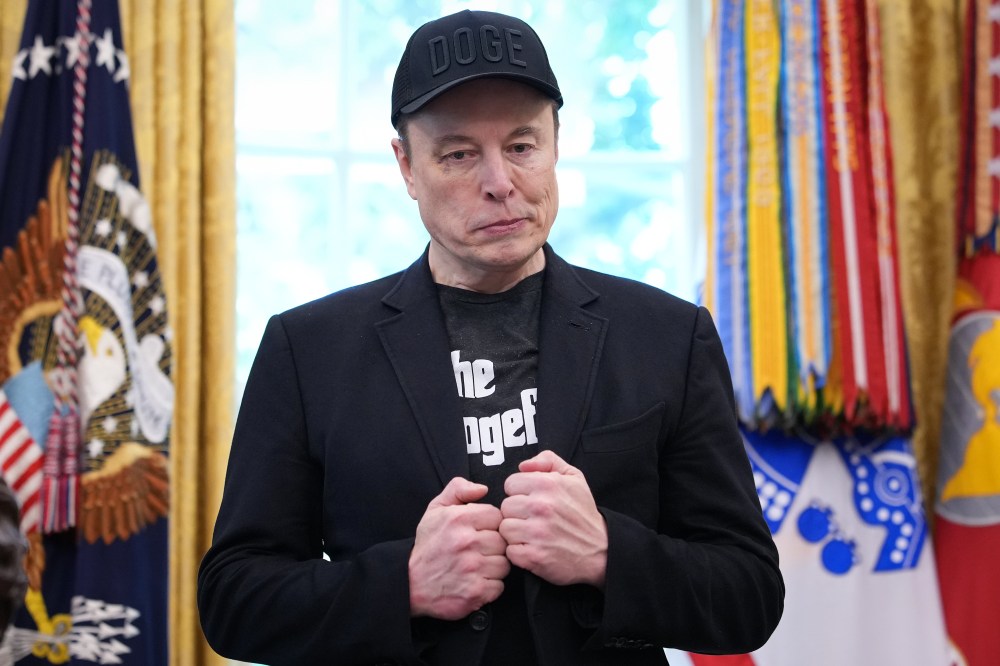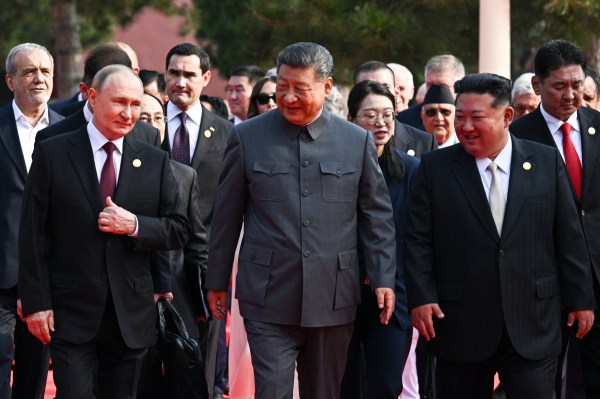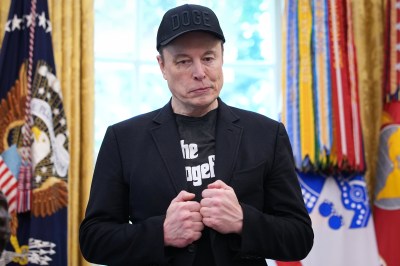At The Dispatch we’re all about owning up to our mistakes. So I’ll own up to one of mine.
In December, Elon Musk turned Congress upside down by manically denouncing a government funding bill that was poised to pass the Republican House. Across dozens of tweets, he condemned the legislation as “criminal,” lied flagrantly about what it would do, and warned that any GOP member who voted for it deserved to be ousted in their next election.
When the richest man in history starts musing about primarying lawmakers who cross him, those lawmakers listen. Republican support for the bill collapsed almost instantly, killing the version of it that had offended Musk. Even Donald Trump seemed caught off guard by the populist groundswell that Elon instigated: Reportedly he had no objection to the legislation until Musk raised a stink, whereupon the president-elect hastily declared that he too now opposed it.
Enjoy watching Elon bully Republicans into pretending that they care about spending, I wrote on December 20, because it’ll never happen again. “Musk may sincerely prefer a more fiscally responsible government in principle,” I argued, “but he isn’t going to risk alienating a gigantic chunk of his social media following by going to war with Trump over it.”
Oops. On Tuesday, Elon went to war.
“I’m sorry, but I just can’t stand it anymore,” he tweeted about the Big, Beautiful Bill that passed the House last month. “This massive, outrageous, pork-filled congressional spending bill is a disgusting abomination. Shame on those who voted for it: You know you did wrong. You know it.” A few weeks ago Musk told an audience in Qatar that he planned to reduce or even end his spending on politics going forward, but yesterday he hinted at a change of plans. “In November next year, we fire all politicians who betrayed the American people,” he warned, replying to another user’s complaint about the GOP.
The American right in the age of Trump is a faction that governs by intimidation. Elon Musk is the only person in the United States besides the president himself who, by dint of his fortune and his enormous following, can credibly intimidate Republican lawmakers. And here he was, leaning into it.
His intervention came in the nick of time for fiscal conservatives in Congress who are under pressure from Trump to back the bill despite their misgivings. Libertarians Rand Paul and Thomas Massie, both recent targets of presidential tantrums, tweeted their support for Elon’s position. Meanwhile, a White House official described the reaction to Elon’s about-face in the West Wing to Politico as “perplexed, unenthused, and disappointed.” Speaker Mike Johnson went as far as to accuse the Tesla CEO of being privately aggrieved that the bill will end tax credits for electric vehicles and pretending to oppose it for more principled reasons.
Until yesterday there was zero chance that cowardly congressional Republicans would defy the president by tanking his big, beautiful fiscal disaster. Now that Musk has offered them populist cover to do so, the chances aren’t high—but they’re no longer zero. It was inevitable that two egos as malign and grandiose as his and Trump’s would clash, but I never imagined Elon might try to sabotage the one piece of congressional legislation that the president cares about, the centerpiece of his economic agenda.
Why is Musk doing this?
Elon’s legacy.
“It’s because he cares deeply about budget deficits,” you might say.
Does he? Then why did he misidentify “pork” as a key problem with the bill in his tweet yesterday?
Neither pork nor “waste, fraud, and abuse,” the other perennial scapegoat of pretend fiscal hawks, are the cause of unsustainable federal spending. Politicians gripe about them because they’re unpopular, and because doing so feeds the useful illusion that deficits are driven by massive public corruption. Greedy lawmakers are funding unnecessary projects in their home states and districts, greedy bureaucrats are padding their budgets with unnecessary expenditures, and greedy taxpayers are applying for benefits that they’re not eligible to receive.
It’s a perfect populist narrative, reducing a complex policy dilemma to a simple morality tale. Crack down on the evildoers who are fleecing the people—drain the swamp, to borrow a phrase—and the problem will melt away.
It’s childish idiocy. Entitlement spending and the interest we pay on the debt we’ve incurred to sustain it are the main drivers of annual deficits, not pork. Republicans can’t balance the budget, and Elon Musk couldn’t make meaningful cuts at DOGE, because spending on programs like Medicare and Social Security is so popular that to slash them would amount to political suicide. Trump’s big, beautiful bill not only fails to address that problem, it piles additional annual deficits on top of it. That’s what actually makes it “a disgusting abomination.”
The strange thing is that neither Elon nor the president seem to have understood this as of January 20. If they did, one assumes, they wouldn’t have set their target for spending cuts as preposterously high as $2 trillion, dooming themselves not just to fail but to fail miserably. Last week the Wall Street Journal claimed that Trump had recently posed a question to his advisers about Musk’s lost ambition to cut trillions from the federal budget. “Was it all bullsh-t?” he wondered, innocent as a child.
Of course it was bullsh-t. But if you’re a sucker for populist morality tales, deeply ignorant of how the budget works, and fully bought in on the myth of Elon Musk as some sort of wizard whose ingenuity and strength of will can somehow alter the laws of basic math, you might earnestly have believed that $2 trillion was doable. It seems Musk and Trump are, or were, two such suckers.
In the end, Elon ended up more than 90 percent shy of his target. Some of Trump’s own cronies, from Steve Bannon to Treasury Secretary Scott Bessent, have taunted him about it. He’s leaving government less popular than he used to be, with his flagship business in trouble, dogged by embarrassing headlines about his embarrassing habits (allegedly!), and with nothing much to show for it policy-wise except the needless death and suffering of a lot of people in the third world.
Even his colleagues in the West Wing are glad to see him go. “Musk’s decision to [leave the administration] has been greeted as a relief by many federal leaders, who have been busily undoing many of his cuts in their departments or making DOGE-style changes on their own terms,” The Atlantic reported last month. “I think that everyone is ready to move on from this part of the administration,” one Trump adviser grumbled to the magazine.
Tanking the Big, Beautiful Bill is Elon’s last chance to change his legacy and leave a mark on federal spending. He may not care about (or even understand) the ins and outs of the budget, but he surely grasps that his time in government represents a glaring failure for one of the more successful people who’s ever lived. Watching Republicans tack on another $2.4 trillion in deficits over the next decade as he heads for the exit may have felt like a parting indignity to a man who normally prides himself on being able to impose his will on organizations.
If he couldn’t bend the GOP to his priorities as a member of the administration, he may have concluded, he’ll use his social influence to do it by attacking the bill as an outsider.
Somehow we’ve ended up with an unlikely simulacrum of 2015-era Republican politics. The GOP establishment is pushing massive deficits by pairing steep tax cuts with not-so-steep spending cuts while a faction of populist “conservatarians” flogs them for not doing nearly enough on spending to balance the books. It’s just that instead of John Boehner and Paul Ryan fending off the Freedom Caucus, this time it’s Donald Trump and Mike Johnson fending off Elon Musk. Wasn’t populism supposed to be … different?
First as tragedy, then as farce: Just as all crustaceans eventually evolve into crabs, perhaps all right-wing movements eventually evolve into sellouts and purists squabbling noisily over minor cuts to discretionary spending that ultimately do nothing to reduce America’s debt burden.
Butthurt.
If that theory of Musk’s behavior is too cerebral for you, though, here’s one that’s more venal: Maybe Mike Johnson was right.
The speaker wasn’t the only person who speculated on Tuesday that Elon was butthurt about the House GOP ending tax credits for electric vehicles. “Butthurt” was the word chosen by a source who spoke to Axios, which identified four separate grievances Musk allegedly had with Republicans in recent months. His choice to lead NASA was nixed, his Starlink system wasn’t picked up by the FAA to aid with air-traffic control, and his tenure as a “special government employee” at DOGE wasn’t extended. But the tax credits were a special snub inasmuch as Elon had put money behind his request: “As of late April, [Tesla] had spent at least $240,000 lobbying on behalf of the credit and other company matters. Behind the scenes, sources say, Musk also advocated for the measure in the legislation, but to no avail.”
A Republican “close to the White House” echoed that point to Politico. “When businessmen criticize legislation, journalists don’t take them at their word, they look at how the legislation would impact their business interests,” he said. “They should be doing that in this case.” Another Republican derided Musk to Punchbowl News as “the guy that was pro the package until he realized he wasn’t going to get his way with the EV tax credits."
I’m not sure I buy it. Less than six months ago, Elon was telling reporters that he wanted to get rid of the credits—and not just for high-minded, revenue-raising fiscal reasons. He believed that Tesla, a household name, might gain an advantage over fledgling competitors if buying an electric vehicle suddenly became more expensive. After all, the greater the financial risk of making a purchase, the more inclined customers might be to stick with established brands.
Accusing Musk of being “butthurt” because it might now take him slightly longer to become the world’s first trillionaire smells like a convenient smear by Trump toadies to discredit his opposition to the bill as financially motivated. But I must confess: Although I don’t fully believe it, I kind of want to.
For two reasons. First, nothing would be more classically Republican than for a populist to disguise his true grievances as principled objections to runaway spending. The ease with which small-government Tea Party conservatives transformed into bootlicking Trumpist authoritarians suggests that, whatever was really motivating the backlash on the right to Barack Obama’s administration, it sure wasn’t “constitutionalism” or earnest concerns about deficits. Populist budgetary concerns reliably evaporate the instant a Republican takes the oath of office on January 20. Why shouldn’t Elon be similarly insincere, laughably complaining about “pork” while nursing a grudge over the EV credits he didn’t receive?
The second reason is as close as I’ll ever get to earnest sympathy for Musk. How is it, exactly, that an administration willing to do lavish political favors for every lout who’s ever said a kind word about Trump was unwilling to cut a break for the person who did more than any other last year to get him reelected?
The whole point of Trump 2.0 is to reward the president’s friends and punish his enemies. No one, including violent criminals, is too unsavory to receive a life-changing favor from the White House. “No MAGA left behind,” as “Eagle Ed” Martin put it, summarizing the corrupt logic behind Trump’s patronage.
Somehow Elon Musk, one of the most popular and influential figures in the Republican Party, got left behind on a legislative request that was important to him.
One could understand stiffing him on the EV credits if the Big, Beautiful Bill was an earnest attempt to cut spending. Getting serious about balancing the budget means cracking down on special interests; if American retirees have to make do with fewer benefits in their old age, it’s only fair that Tesla fans have to pay a little more for their Cybertrucks. Austerity should be a shared burden.
But the bill isn’t earnest. It’s a sham, a “disgusting abomination” just like Musk said—and somehow he still got stiffed by his friends Donald Trump and Mike Johnson. If the GOP insists on running massive deficits for years to come, why not make them a tiny bit more massive by helping Tesla customers out? Why, it’s downright insulting that they didn’t.
And it’s almost certainly in bad faith. The most amazing detail in the reporting about Elon’s long farewell from the Trump administration is how many times his requests were denied due to (deep breath) ethical concerns. Per Axios, when he asked to stay on at DOGE beyond the 130 days allowed by statute, he was apparently told—by Donald Trump’s deputies—that rules are rules. His proposal to foist Starlink on the FAA was rejected in part because of “the appearance of a conflict of interest,” of all things.
When news broke in April that Musk was set to receive a Pentagon briefing about China, Trump himself allegedly complained on ethical grounds. “He said Musk getting the briefing was a conflict of interest,” two administration officials told the Wall Street Journal. “Trump told aides that Musk, who has space contracts, shouldn’t be working at the Pentagon.” How jarring it must have been for the president to experience a feeling as unfamiliar as a pang of conscience.
Imagine being Elon Musk, watching the many pigs around you feeding noisily from the trough, and being told repeatedly that your comparatively minor corruption offends the administration’s sense of propriety. No wonder he’s butthurt.
Go figure that when an opportunity arose to push the plunger on the lousy bill that the White House has its heart set on, Elon couldn’t resist.
Two questions.
As congressional Republicans scramble to meet Trump’s deadline of July 4 for final passage of the bill, what happens between now and then will answer two important questions about Musk and his political future.
First, what were his motives here? If the House and Senate GOP appease him by restoring EV credits to the legislation and he drops his objections, we’ll know definitively that his “principled” opposition to the bill was simply a negotiating tactic. More so than ever before, bribery is how Republicans conduct political business now. Greasing Elon’s palm might lead him to back off.
But what if it doesn’t? In that case, we come to the second question: Just how much influence over the populist right does a diminished Elon Musk have?
Not much, I’d guess—or at least not much in a pure test of political strength with Donald Trump, especially where defeat for the president would mean being humiliated by his own party on his biggest (i.e. only) legislative priority. If the grassroots right cared about spending on the merits, Elon would stand a chance. But it doesn’t, as I explained earlier, so a prolonged Trump-Musk standoff would boil down to what every right-wing “policy” disagreement eventually boils down to now: Are you on the president’s side or the enemy’s?
If Elon were to beat the odds and win that standoff, it might alter the trajectory of the GOP. He’d become the first and only person to have challenged Trump from the right and won, a feat that heir apparent J.D. Vance could never manage. Musk’s political strength would be greater than ever and the long-term prospects of populist welfare-state-ism advancing on the right would be in doubt.
But even if Elon loses, as everyone expects, he’ll end up more powerful than he was before. There’s no shame in losing a test of strength with Trump on the right, after all, and meanwhile he’ll have reminded congressional Republicans in a stark way that he’s prepared to ride herd on them after the president finally leaves politics. Once Trump is gone, the biggest private fortune ever assembled by a human being will be available to punish GOPers who resist Musk’s policy priorities. That he dared to challenge Trump at a moment as fraught as this one will show them that he’s not to be trifled with, in fact.
Not bad for a guy who’s supposedly leaving Washington with his “tail between his legs.” The king is dead; long live the king.







Please note that we at The Dispatch hold ourselves, our work, and our commenters to a higher standard than other places on the internet. We welcome comments that foster genuine debate or discussion—including comments critical of us or our work—but responses that include ad hominem attacks on fellow Dispatch members or are intended to stoke fear and anger may be moderated.
With your membership, you only have the ability to comment on The Morning Dispatch articles. Consider upgrading to join the conversation everywhere.